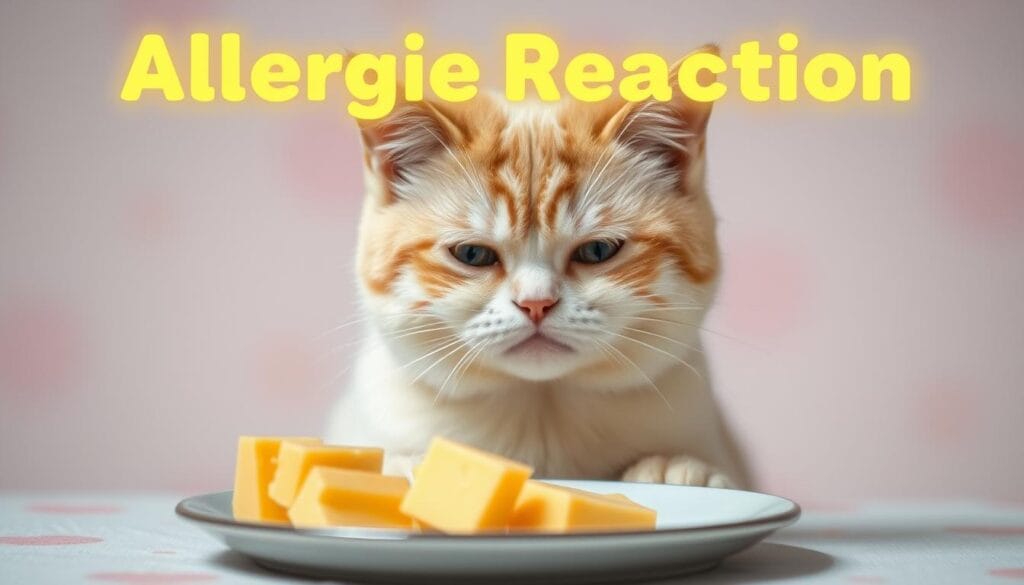
Table of Contents
As a cat owner, you might have wondered ‘Can cats eat cheese?’ when seeing your cat’s interest in it. Cats love the creamy taste, but can they eat it safely? Most cats can’t digest cheese well because they are lactose intolerant. Before giving your cat cheese, it’s key to know the risks and how to do it right.
This guide will dive into cats and dairy, debunking myths about milk. We’ll also show you how to safely add cheese to your cat’s diet. By the end, you’ll know how to choose the right cheese for your cat, keeping their health first.
Understanding Cats and Dairy Products
Many of us picture cats drinking milk, but the truth is different. Most cats can’t digest lactose in dairy products like milk and cheese. Kittens can drink milk, but as they grow, they lose this ability.
The Truth About Cats and Lactose
Cats, like many adults, often can’t handle lactose. This leads to diarrhea, vomiting, and stomach pain. As cats get older, they make less of the lactase enzyme needed to digest lactose.
Why Most Cats Are Lactose Intolerant
Cats’ bodies aren’t made for dairy. As they grow up, they make less lactase enzyme. This helps protect them from stomach problems caused by dairy.
The Myth of Cats and Milk
The idea of cats drinking milk is a common myth. Kittens can drink their mother’s milk, but adult cats often get sick from it. Many pet owners unknowingly upset their cats by giving them milk or cheese.
Can Cats Eat Cheese: A Comprehensive Guide
Cats might like the taste of cheese, but it’s not good for them. Most cats can’t digest dairy like cheese because they’re lactose intolerant. This can cause problems like diarrhea, constipation, or vomiting.
As cats grow up, they make less lactase enzyme. This makes it hard for them to digest dairy, including cheese. Cheese also has a lot of salt, fat, and other things that can harm cats.
| Cheese Safety for Cats | Recommended | Not Recommended |
|---|---|---|
| Lactose Content | Hard cheeses like cheddar, Swiss, and Parmesan have lower lactose levels and may be better tolerated. | Soft, creamy cheeses like brie, camembert, and blue cheese have higher lactose content and can cause digestive issues. |
| Ingredients | Plain, unsalted, and unflavored cheeses are safer options. | Cheese varieties with added spices, garlic, onions, or other flavorings can be toxic to cats. |
| Fat and Sodium Content | Small, occasional treats of low-fat, low-sodium cheeses are generally safe. | Excessive fat and sodium from cheese can lead to weight gain, obesity, and other health problems in cats. |
Even though cats might like cheese, it should only be given as an occasional treat. It’s best to give it in very small amounts, with a vet’s okay. Cheese should never be a regular part of a cat’s diet because it doesn’t have the nutrients they need.
“Cheese is not a natural or necessary part of a cat’s diet, and it can lead to health issues if consumed in excess.”
Cats are meant to eat mostly meat because their bodies are designed for it. They need certain nutrients found in animal products, like taurine and vitamin A. Cheese, being a dairy product, doesn’t provide these essential nutrients.
In summary, while cats might enjoy a little bit of feline-safe cheese now and then, it’s important to remember to give it in moderation. Always check with a vet before giving cheese to your cat. The risks of too much cheese in their diet are too great for their health.
Health Risks of Feeding Cheese to Cats
Cats may enjoy the taste of cheese, but it’s not good for them. They need animal-based nutrients like protein and fat. Cheese, however, is high in fat, calories, and sodium. It also has lactose, which can be harmful.
Salt Poisoning and Its Symptoms
Too much salt from cheese can harm cats. It can cause them to drink more water, feel confused, and even have seizures. It’s important to watch how much cheese your cat eats to avoid this serious problem.
Obesity Concerns
Cheese is full of calories, which can make cats gain weight. Being overweight can cause many health issues, like joint problems and diabetes. It’s key to control how much cheese your cat eats to keep them healthy.
Signs of Lactose Intolerance
Most adult cats can’t digest lactose in dairy products like cheese. This can lead to vomiting, diarrhea, and stomach pain. If your cat shows these signs after eating cheese, it’s a sign they’re lactose intolerant.
Even a small amount of cheese can be okay sometimes. But, always talk to your vet before adding new foods to your cat’s diet. Your cat’s health is the most important thing.
Safe Cheese Options for Your Feline
Feeding your cat cheese needs careful thought. Not all cheese is good for cats. Choose hard, low-lactose cheeses to avoid digestive problems.
Cheddar, Swiss, and Parmesan are great choices. They have less lactose, making them safer. Cottage cheese and goat cheese are also good. But always introduce new foods slowly and in small amounts.
Cheese should only be a small part of your cat’s diet, about 10% or less. Cats need a balanced diet of high-quality cat food. Cheese is just an occasional treat, not a replacement for their regular meals.
The Pros and Cons of Cheese for Cats
- Pros: Cheese is low in carbs and cats love it. It can also help hide medicine.
- Cons: Cheese is high in fat and salt. Many cats can’t digest lactose, leading to vomiting, gas, and diarrhea.
For your cat’s health, it’s safer to be cautious. Give them small amounts of the right cat-friendly cheese now and then. This way, you can satisfy their cheese cravings without harming their health.
Types of Cheese to Avoid
Cheese can be tasty for some cats, but not all types are safe. Cats can’t digest dairy well. The wrong cheese can cause serious health problems.
Dangerous Cheese Varieties
Stay away from soft, moldy cheeses like blue cheese or Roquefort. They can be toxic to cats and cause stomach issues, vomiting, and even brain problems. Also, avoid cheeses with mold or fungus as they can have harmful toxins.
Processed Cheese Products
Processed cheeses like American cheese, cheese slices, and spreads are bad for cats. They have additives, preservatives, and too much sodium. These can harm your cat’s health. Choose natural, unprocessed cheeses instead.
Flavored and Seasoned Cheeses
Cheeses with flavorings, spices, or herbs are risky for cats. Ingredients like garlic, onions, and chives are toxic. They can upset your cat’s stomach, cause anemia, and damage organs. Don’t give your cat flavored cheese.
For cheese, give your cat small amounts of plain, natural types like cheddar or Swiss. Always talk to your vet before adding new foods to your cat’s diet.
| Cheese Variety | Suitability for Cats |
|---|---|
| Blue cheese | Avoid – Contains toxic compounds |
| Processed cheese products | Avoid – High in additives and sodium |
| Flavored/seasoned cheeses | Avoid – May contain toxic ingredients like garlic and onions |
| Cheddar | Safe in moderation |
| Swiss | Safe in moderation |
While cheese can be a treat, choose wisely. Avoid harmful cheeses to keep your cat healthy and happy.
Proper Serving Sizes and Frequency
Feeding cats cheese should be done with care. Cats can have cheese, but it should not be a regular food. Cheese doesn’t offer much nutrition compared to their natural diet.
Experts say to give cats a small cube of cheese, about 1 ounce, once or twice a week. This size keeps cheese treats under 10% of their daily calories. For a 10-pound cat, that’s about 28 calories a day.
- Always measure cheese portions to avoid overfeeding, as cats can easily become overweight or obese from excessive treats.
- Soft cheeses like brie or cream cheese may be higher in lactose, while harder varieties like cheddar and parmesan usually contain less lactose.
- Certain cheese additives like onions, garlic, and chives can be harmful to cats, so it’s best to stick to plain, unseasoned cheese.
Talk to your vet for advice on your cat’s diet and cheese. They can help with the right amount and how often based on your cat’s age, weight, and health.

“Cats lack the enzyme necessary to break down lactose in dairy products, leading to potential lactose intolerance symptoms.”
By following these tips, you can give your cat cheese as an occasional treat. This way, you meet their nutritional needs and keep them healthy.
Using Cheese as a Medication Aid
Administering medication to your cat can be tricky. Hiding pills in cheese is a good idea. But, picking the right cheese and using the right method is key for your cat’s safety and comfort.
Tips for Hiding Pills in Cheese
- Choose a small amount of low-lactose cheese like cheddar or gouda. This reduces the chance of lactose intolerance.
- Make sure the pill is fully covered in cheese. This hides its scent and taste.
- Give the cheese-covered pill in a calm place. This helps lower your cat’s stress.
Alternative Methods
If cheese doesn’t work, try other safe foods. Small pieces of cooked chicken or fish are good. Or, use pill pockets for cats. These hide the pill’s taste and smell, making it easier for your cat.
Success in giving medicine to your cat depends on finding what works for them. Be patient and try different ways. Always talk to your vet for the safest and most effective methods.
“The less fuss made during the medication process, the more likely you are to be successful. Focus on keeping your cat calm and comfortable throughout the experience.”
Signs Your Cat Is Having an Adverse Reaction to Cheese
Feeding your cat cheese might seem like a nice treat. But, it’s important to watch for any bad reactions. Cats often can’t digest lactose well, and too much cheese can cause stomach problems. Look out for signs that your cat might be having trouble with cheese.
If your cat vomits, has diarrhea, constipation, feels bloated, or has too much gas after eating cheese, it’s a sign of trouble. Some cats might also get skin problems or scratch a lot because of an allergy to cheese proteins.
If you see any of these cheese allergy in cats or feline food intolerance signs, stop giving cheese right away. Then, talk to your vet as soon as possible. They can figure out why your cat is having cat digestive issues and suggest better food options.
| Symptom | Potential Cause |
|---|---|
| Vomiting | Lactose intolerance, milk protein allergy |
| Diarrhea | Lactose intolerance, milk protein allergy |
| Constipation | High-fat content in cheese |
| Bloating and gas | Lactose intolerance |
| Skin irritation and excessive scratching | Milk protein allergy |
By watching your cat closely after they eat cheese, you can keep them healthy. A balanced diet that meets their needs is key to a happy cat.

Conclusion
Cats can have small amounts of certain cheeses, but dairy is not key to their diet. Most cats can’t digest lactose well, leading to stomach problems. For cat nutrition advice, focus on a diet made for cats.
If you give your cat cheese, pick low-lactose types like Cheddar or Swiss. Only give a small piece once or twice a week. Always check with your vet for feline dietary recommendations to keep your cat healthy.
While cheese treats are okay sometimes, a balanced diet is more important. It gives your cat the nutrients they need. By following these tips, you can keep your cat happy and healthy, even with the occasional cheese treat.
FAQ: Can Cats Eat Cheese?
Is it safe for cats to eat cheese?
While cheese isn’t toxic to cats, it’s not entirely safe as a regular treat. Most cats are lactose intolerant, meaning they lack the necessary enzymes to properly digest dairy products. Small amounts of hard, aged cheese occasionally may be okay, but it’s best to avoid making it a regular part of their diet.
What happens if a cat eats a bit of cheese?
When a cat eats a small amount of cheese, they might experience mild digestive issues like diarrhea, vomiting, or stomach upset. However, some cats may show no symptoms at all. The reaction depends on the individual cat’s level of lactose intolerance and the amount consumed.
Why do cats go crazy for cheese?
Cats are attracted to cheese because of its high protein and fat content. Their keen sense of smell detects these nutritious components, and the strong aroma can be particularly appealing. Additionally, the creamy texture may remind them of their natural prey’s fat content.
How much cheese can I give my cat?
If you choose to give your cat cheese, limit it to a tiny piece (about the size of a dice) no more than once a week. Some veterinarians recommend avoiding cheese altogether due to its potential digestive issues.
Which types of cheese are safer for cats?
Hard, aged cheeses like cheddar, Swiss, or Gouda contain less lactose and are generally safer for cats compared to soft cheeses. However, processed cheese products and cream cheese should be avoided entirely.
Can kittens eat cheese?
Kittens should not eat cheese. While they can digest their mother’s milk, they lose the ability to process lactose as they grow older. Introducing cheese to kittens can cause more severe digestive issues than in adult cats.
Are some cats allergic to cheese?
Yes, beyond lactose intolerance, some cats can be allergic to the proteins in cheese. Signs of a cheese allergy include itching, swelling, difficulty breathing, or severe gastrointestinal problems. If you notice these symptoms, consult your veterinarian immediately.
What are better alternatives to cheese for cat treats?
Instead of cheese, consider commercial cat treats, small pieces of cooked lean meat, or tiny bits of pure meat baby food. These alternatives are more suitable for a cat’s digestive system and nutritional needs.
Can cheese be used to hide medications for cats?
While cheese is commonly used to hide medications, there are better alternatives like pill pockets or specially designed treats for medication. If you must use cheese, use the smallest amount possible and consult with your veterinarian first.
Source Links
- Can Cats Eat Cheese? Here’s What Vets Say – https://www.rd.com/article/can-cats-eat-cheese/
- Can Cats Eat Cheese? Vet-Approved Facts & FAQ – Catster – https://www.catster.com/nutrition/can-cats-eat-cheese/
- Can Cats Eat Cheese? Read Before You Feed | Purina – https://www.purina.co.uk/articles/cats/feeding/what-cats-eat/can-cats-eat-cheese
- Can Cats Eat Cheese? – https://www.petmd.com/cat/nutrition/can-cats-eat-cheese
- Can Cats Eat Cheese? Yes, But… – https://www.pumpkin.care/blog/can-cats-eat-cheese/
- Can Cats Eat Cheese? Read Before You Feed | Purina – https://www.purina.co.nz/articles/cats/feeding/what-cats-eat/can-cats-eat-cheese
- Can Cats Eat Cheese? A Guide to Feline Cheese Consumption – https://cabinethealth.com/blogs/journal/can-cats-eat-cheese-a-guide-to-feline-cheese-consumption?srsltid=AfmBOoouxEWubME-30jytWXcnC_3GJU8IFZyfegdNJ6ZGaYO_s_Es0Ep
- Is Cheese Bad for Cats? – https://basepaws.com/cat-insider/can-cats-eat-cheese?srsltid=AfmBOorqZEgQtSJsZ2D-FI2L0WORyrhH6pmeco0ByR9sAl2FtYXMCRkI
- Can Cats Eat Cheese? – https://noblevetclinic.com/blog/can-cats-eat-cheese
- Can Cats Eat Cheese? All You Need To Know – The Pet Staff – https://thepetstaff.com/cats/diet/can-cats-eat-cheese/
- Can Cats Eat Cheese? – https://be.chewy.com/nutrition-pet-diet-tips-can-cats-eat-cheese/
- Can cats eat cheese? | Blog – https://www.cats.org.uk/cats-blog/can-cats-eat-cheese
- Can Cats Eat Cheese? It’s Complicated – https://www.dailypaws.com/cats-kittens/cat-nutrition/what-can-cats-eat/can-cats-eat-cheese
- Can Cats Eat Cheese? – https://conservationcubclub.com/can-cats-eat-cheese/
- Nutrition – General Feeding Guidelines for Cats | VCA Animal Hospitals – https://vcahospitals.com/know-your-pet/nutrition-feeding-guidelines-for-cats
- What Do Cats Eat? (Ideal Cat Diet, Portion Size, Frequency, and Feline Nutrition Guide) – https://www.linkedin.com/pulse/what-do-cats-eat-ideal-cat-diet-portion-size-frequency-anees-ashraf-cslmf
- How to Give a Cat a Pill – https://bestfriends.org/pet-care-resources/how-give-cat-pill
- Giving Medication – https://thecatdoctor.co.uk/cat-health/giving-medication/
- Can Cats Eat Cheese? – Pet Insurance Review – https://www.petinsurancereview.com/blog/can-cats-eat-cheese
- My Cat Ate Cheese: Vet Approved Advice on What to Do – Catster – https://www.catster.com/nutrition/cat-ate-cheese-what-to-do/
- Can Cats Eat Cheese? Here’s Everything You Need to Know – https://www.pawlicy.com/blog/can-cats-eat-cheese/
- Food Allergies in Cats | VCA Animal Hospitals – https://vcahospitals.com/know-your-pet/food-allergies-in-cats
- Is Cheese Bad for Cats? – https://basepaws.com/cat-insider/can-cats-eat-cheese?srsltid=AfmBOoqjd8mtcOWxhhqeq5JKUzkVIfF1H7lIqJZ_acz68_k3nEl9sPFh
- Can Cats Eat Cheese? Vet Approved Facts & FAQ | PangoVet – https://pangovet.com/pet-nutrition/cats/can-cats-eat-cheese/







